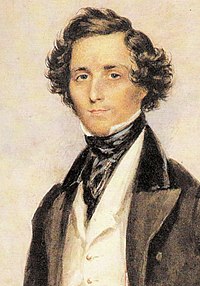Background
Goethe wrote this text to be set to music, intending it for his friend Carl Friedrich Zelter, who tried twice, in 1799 and 1812, but did not complete a setting. Mendelssohn, who knew Goethe, first took it up in 1830.
The story is about how a prank allows for a local tradition to take place in spite of opposition from an intolerant new regime. The Druids and local heathen would celebrate May Day, but, as a women's chorus warns, this is now forbidden. The Druid priests counter that those who fear to sacrifice deserve their chains. A comic solution emerges as a Druid watchman suggests a masquerade of the Devil, spirits, and demons to frighten the occupying Christians. The Christians are scared away, and the Druids and heathen are left to celebrate Spring and the Sun.
The attractions of this text for Mendelssohn likely were the ghost scene (compare his incidental music to A Midsummer Night's Dream ) and the triumph (by guile) of an oppressed group in an occupied land, an important Enlightenment idea, as well as one perhaps reflecting the composer's Jewish background: the final verses of the oratorio emphasize an abstract divinity ("dein Licht") over a threatened earthly ritual ("den alten Brauch"). According to Melvin Berger, Mendelssohn was raised a Protestant but "was never fully accepted as a Christian by his contemporaries, nor was he ever fully cut off from his Judaic heritage." Consequently,
Musicians have long debated whether Mendelssohn's three major choral works reflect his religious duality—born into what had been a Jewish family, but living as a Lutheran. The main subject of St. Paul is a figure from the New Testament who, although born as a Jew, became an early leader of Christianity. The First Walpurgis Night sympathetically describes pagan rituals and presents Christians in a poor light. And Elijah probes the wisdom of an Old Testament prophet from Israel.
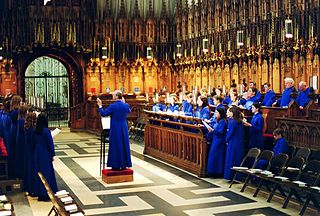
A choir is a musical ensemble of singers. Choral music, in turn, is the music written specifically for such an ensemble to perform. Choirs may perform music from the classical music repertoire, which spans from the medieval era to the present, or popular music repertoire. Most choirs are led by a conductor, who leads the performances with arm, hand, and facial gestures.

A cantata is a vocal composition with an instrumental accompaniment, typically in several movements, often involving a choir.

Frank Martin was a Swiss composer, who spent much of his life in the Netherlands.

Walpurgis Night, an abbreviation of Saint Walpurgis Night, also known as Saint Walpurga's Eve, is the eve of the Christian feast day of Saint Walpurga, an 8th-century abbess in Francia, and is celebrated on the night of 30 April and the day of 1 May. This feast commemorates the canonization of Saint Walpurga and the movement of her relics to Eichstätt, both of which occurred on 1 May 870.

Elijah, Op. 70, MWV A 25, is an oratorio by Felix Mendelssohn depicting events in the life of the Prophet Elijah as told in the books 1 Kings and 2 Kings of the Old Testament. It premiered on 26 August 1846.
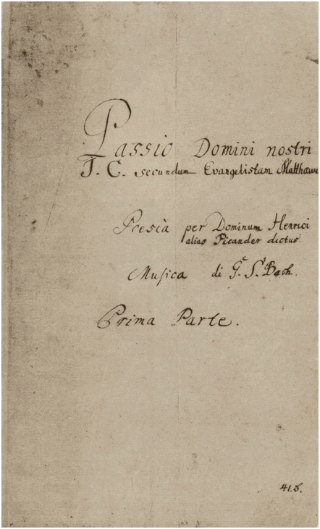
The St Matthew Passion, BWV 244, is a Passion, a sacred oratorio written by Johann Sebastian Bach in 1727 for solo voices, double choir and double orchestra, with libretto by Picander. It sets the 26th and 27th chapters of the Gospel of Matthew to music, with interspersed chorales and arias. It is widely regarded as one of the masterpieces of Baroque sacred music. The original Latin title Passio Domini nostri J.C. secundum Evangelistam Matthæum translates to "The Passion of our Lord Jesus Christ according to the Evangelist Matthew".
Ivan the Terrible, Op. 116, is the score composed by Sergei Prokofiev for Sergei Eisenstein's film Ivan the Terrible (1942–45) and its sequel (1946), the first two parts of an incomplete trilogy. The project was Prokofiev's second collaboration with Eisenstein, the first being the popular Alexander Nevsky (1938). The majority of the non-liturgical song texts were written by Vladimir Lugovskoy, who collaborated with Prokofiev on the texts for Alexander Nevsky.
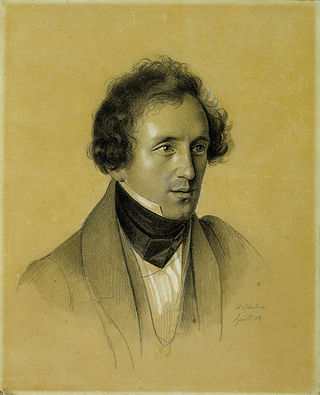
St. Paul, Op. 36, is an oratorio by Felix Mendelssohn. The composer oversaw versions and performances in both German and English within months of completing the music in early 1836.
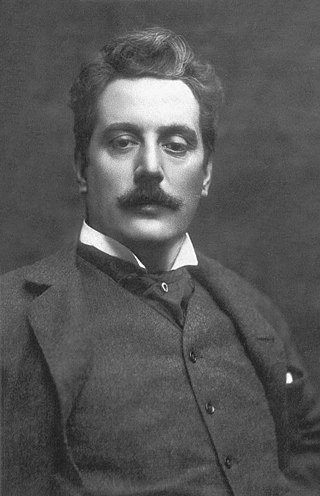
Giacomo Puccini's Messa or Messa a quattro voci is a Mass composed for orchestra and four-part choir with tenor and baritone soloists. Strictly speaking, the piece is a full Mass, not a true Messa di Gloria.

Joshua is an oratorio by George Frideric Handel. It was composed in a month, from 19 July 1747 to 19 August 1747, six months before the beginning of the oratorio season. Joshua is Handel's fourth oratorio based on a libretto by Thomas Morell. The oratorio premiered on 9 March 1748 at the Covent Garden Theatre, London. Joshua is based on the Biblical story of Joshua as the leader of the ancient Israelites. The story follows the Israelites from their passage over the Jordan River into Caanan and through the Battle of Jericho. The work also includes a love story elaborated from a few hints in the Biblical narrative between Caleb's daughter Achsah and Othniel, a young soldier.

An Occasional Oratorio is an oratorio by George Frideric Handel, based upon a libretto by Newburgh Hamilton after the poetry of John Milton and Edmund Spenser. The work was written in the midst of the Jacobite rising of 1745–1746, the attempt to overthrow Handel's patrons – the Hanoverian monarchy under George II – and replace them with a Stuart restoration under Charles Edward Stuart, "Bonnie Prince Charlie". The Occasional Oratorio is unique among Handel's works which he labelled "oratorio" in that it does not tell a story or contain elements of a drama, but was intended as a defiant and patriotic rallying piece.

Scenes from Goethe's Faust is a musical-theatrical work by composer Robert Schumann. The work has been described as the height of his accomplishments in the realm of dramatic music. The work was written between 1844 and 1853 and is scored for SATB chorus, boys' chorus, orchestra, and a number of solo parts which, even with doubling, require seven solo singers, although eight is the usual number for a performance. Schumann never saw all three parts of the work performed in the same concert, or published together. Eric Sams comments 'There is no coherence in the orchestration, which audibly dates from two different periods ', leading him to conclude that Schumann did not conceive the work as a whole, although late nineteenth-century ideas of performance mean that in the modern era the piece is predominantly heard with all three parts.

The Prodigal Son is an oratorio by Arthur Sullivan with text taken from the parable of the same name in the Gospel of Luke. It features chorus with soprano, contralto, tenor and bass solos. It premiered in Worcester Cathedral on 10 September 1869 as part of the Three Choirs Festival.

Lior Navok is an Israeli classical composer, conductor and pianist. He was born in Tel Aviv. His music has been performed internationally by orchestras and ensembles including the Oper Frankfurt, Nuernberg Opera, Israel Philharmonic Orchestra, Boston Modern Orchestra Project, and the Tanglewood Festival Orchestra. Amongst the awards he has received are those from the Israel Cultural Excellence Foundation and the Massachusetts Cultural Council. He has also received awards from the Fromm Music Foundation, Lili Boulanger Memorial Fund Award, and Israel Prime Minister Award. In 2004, he was one of seven composers awarded commissions for new musical works by the Serge Koussevitzky Foundation in the Library of Congress and the Koussevitzky Music Foundation.
Hermann Reutter was a German composer and pianist who worked as an academic teacher, university administrator, recitalist, and accompanist. He composed several operas, orchestral works, and chamber music, and especially many lieder, setting poems by authors writing in German, Russian, Spanish, Icelandic, English, and ancient Egyptian and Greek, among others.

St. Cecilia Mass is the common name of a solemn mass in G major by Charles Gounod, composed in 1855 and scored for three soloists, mixed choir, orchestra and organ. The official name is Messe solennelle en l’honneur de Sainte-Cécile, in homage of St. Cecilia, the patron saint of music. The work was assigned CG 56 in the catalogue of the composer's works.
Creation/Creator is an oratorio for soprano, mezzo-soprano, tenor, baritone, bass, chorus, and orchestra by the American composer Christopher Theofanidis. The work was commissioned by the Atlanta Symphony Orchestra and was first performed on April 23, 2015 by the soprano Jessica Rivera, mezzo-soprano Kelley O'Connor, tenor Thomas Cooley, baritone Nmon Ford, bass Evan Boyer, the actors Steven Cole and Shannon Eubanks, and the Atlanta Symphony Chorus and Orchestra under the conductor Robert Spano.

Charles Clement Fussell is an American composer and conductor of contemporary classical music. He has composed six symphonies and three operas. His symphony Wilde for solo baritone and orchestra, based on the life of Oscar Wilde and premiered by the Newton Symphony Orchestra and the baritone Sanford Sylvan in 1990, was a finalist for the 1991 Pulitzer Prize for Music. He received a citation and award from the American Academy of Arts and Letters in 1992.
Detlef Roth is a German operatic bass-baritone.
